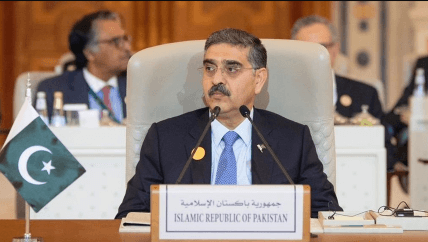Pakistan Urges Developed Nations to Fulfill $100B Climate Pledges.
Developed Nations to Fulfill $100B Climate Pledges
Pakistan’s interim Prime Minister, Anwaarul Kakar, has called on industrialized nations to uphold their promise to provide developing countries with $100 billion in annual climate finance. This plea comes as the United Nations’ two-week climate conference, COP28, convenes in Dubai, drawing around 70,000 participants from across the globe.
Underscoring the existential threat posed by climate change, Kakar highlighted the devastating “super-floods” that ravaged much of Pakistan last year, along with forecasts that 2023 will be the world’s hottest year on record.
Read More: IMF & Pakistan Working For New Program
In his address to COP28, Kakar implored developed countries to provide developing nations with sufficient, additional, and predictable grant-based climate finance to effectively address the climate crisis. He emphasized that the $100 billion climate finance commitment must be met without compromising development funding or exacerbating the already substantial debt burdens of developing nations.
Kakar urged developed nations to take the lead in enhancing global mitigation efforts and provide assistance to developing countries in doing the same. He stressed the need for achieving global resilience through an ambitious framework for the global adaptation goal.
Underscoring the critical role of adaptation, Kakar advocated for allocating at least half of climate finance specifically to adaptation efforts. He emphasized the importance of clear targets, indicators, and regular progress monitoring to ensure the effectiveness of climate finance utilization.
The Alarming Escalation of Climate Change; Pakistan Urges Developed Nations to Fulfill $100B Climate Pledges
Pakistan’s experiences serve as a stark reminder of the escalating climate crisis. The country’s unprecedented floods in 2022 displaced millions, caused widespread infrastructure damage, and severely impacted agricultural productivity.
Read More: Pakistan-Afghanistan Border Reopens after Visa Rule Suspension
Moreover, the projected rise in global temperatures poses a grave threat to Pakistan’s water security, as glaciers in the Hindu Kush and Karakoram mountain ranges, which serve as the country’s primary water sources, continue to melt at an alarming rate.
Pakistan’s Adaptation and Mitigation Efforts
Despite facing these formidable challenges, Pakistan has demonstrated its commitment to climate action. The country has developed a comprehensive national adaptation plan and launched the innovative Living Indus initiative, which aligns climate action with environmental conservation efforts.
Furthermore, Pakistan played a pivotal role in establishing the global loss and damage fund, a mechanism designed to provide financial assistance to developing countries that are disproportionately affected by climate change.
The Need for Equitable and Inclusive Climate Action
Kakar emphasized the principle of equity and differentiated responsibilities in addressing climate change. Developed nations, as the primary historical emitters of greenhouse gases, bear a greater responsibility to take ambitious mitigation actions and provide substantial climate finance to developing countries.
Read More: Illicit Economy of Pakistan
He underscored that climate justice requires enabling developing countries to achieve the Sustainable Development Goals, ensuring a sustainable and equitable future for all.




